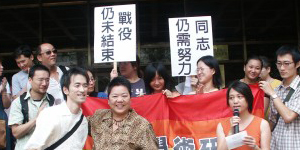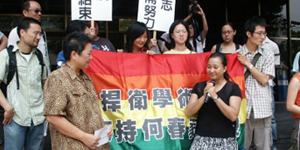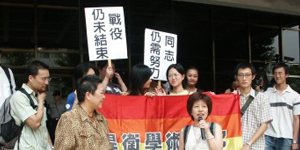After a year of litigation under Article 235 of the criminal code (which has to do with the dissemination of obscenities), Josephine Ho's sexuality studies website has finally been cleared of any criminal conduct by the Taipei District Court on June 25th, 2004. In simple terms, the verdict is "NOT GUILTY"!
A total of 14 religious and conservative groups had jointly brought charges against Professor Josephine Ho, founder and coordinator of the Center for the Study of Sexualities, National Central University, Taiwan in June 2003, following a sensational report by the media concerning the two bestiality hyperlinks found in Ho's sexuality web data bank. The moral panic flared along the lines of "protection of the young against bumping into harmful information while surfing the internet." After two investigative hearings in September, the investigating prosecutor decided to pursue the charge, claiming that Ho's sexuality data bank made graphic and obscene materials easily accessible to all, including minors. Penalty for this so-called criminal behavior could run as high as two years imprisonment plus a huge fine. News about the case spread around the world, and a massive petition drive quickly gathered over two thousand signatures from noted scholars, activists, and students. Formal letters of support from professional groups such as the American Association of University Professors, World Congress of Sexology, and Hong Kong Association of Sex Education also arrived to verify the legitimacy of sex-related research (including zoophilia) which is yet to be recognized in Taiwan.
Formal court proceedings began on January 16, 2004 with over a hundred supporters gathering in front of the court to show support. Activists from local gay and lesbian groups, sex workers groups, gender/sexuality rights groups, HIV support groups, and human rights groups, together with academics and students, turned out in support of Ho who has fought tirelessly for marginal sexualities and freedom of sexual information in Taiwan for the past ten years. Thanks to the massive petition effort by international communities of scholars, activists, and students, the court dealt with the case without the usual crudeness that accompanies stigmatized cases. On the last day of court, May 28, Ho was even allowed to defend her own case in front of the judges. Taking advantage of the first opportunity to make a statement in court, she delivered a 90-minute speech detailing the nature and methodology of sexuality studies, the structure and content of the website, and refuted the numerous errors in the prosecutor's allegations (e.g. the prosecutor's distorted description of the nature of the website databank, the prosecutor's uninformed readings of the articles presented on the webpage, and the prosecutor's exaggerated characterization of easy access to the hyperlinks on the bottom layer of the website data bank).
On June 25, Josephine Ho went to court to hear the verdict, accompanied by dozens of concerned academics, activists, and students. She was met with over a dozen riot police who lined up in front of the court house. When it was rumored that the police were there because there would be protests following the verdict, everyone began preparing for the worst. Upon entering the courtroom, the bailiff instructed all to stand to hear the verdict. Then the three judges who presided over the case appeared. As all waited in anticipation for the worst result, the presiding judge read out the verdict--"Not guilty"--and quickly retired to the backroom. All stood in awe for the result came too quickly and too unexpectedly. In a few seconds, applause was heard in the corridor where many more waited.
When Josephine Ho emerged from the courtroom, she was surrounded by well-wishers and the media alike. Ho expressed gratitude for all the support she has received both from home and from abroad. She then read out a prepared statement, saying that she is gratified that the court has done what the prosecutor did not find it worthwhile to do—to carefully examine the website in question so as to understand the nature and context in which the two hyperlinks were presented. While the not-guilty verdict has restored some faith in the sanity of Taiwanese society, Ho is also saddened that the possible prosecution of provision of web hyperlinks has already produced chilling effects that threaten the freedom of speech and expression of marginal subjects as well as researchers. Ho then announces that in order to counter the obscurantism that surrounds the issue of sexuality, the sexuality data bank which she had put on hold for almost a year is now fully operational and encourages net surfers to visit and learn from the website, including the updated zoophilia webpage. She also appeals to the public to join her in taking actions to amend the laws that infringe upon individual rights to information, association, and privacy. Student representatives and sex work activists also spoke to express their joy as well as to caution against further erosion of an open and tolerant society.
Conservatives were dismayed to hear the verdict and are launching another wave of attack on Ho, beginning by urging the prosecutor to file for an appeal when more conservative judges in the high court may deliver a different verdict. Ho, who has just been elected chair to the English Department by students and faculty alike, has already returned to her work in academic research as well as social activism. If dealt with a different verdict in the high court, she pledges to file for constitution explanation of Chapter 11 of the Constitution of Republic of China--which decrees that the people shall enjoy freedom of speech, freedom of research and teaching, and freedom of publication--and up the ante in this round of ideological contestation. The conservatives may have been thwarted this time through the moral courage of the district court judges, the continued effort by local gender/sexuality activists, and the petition by international academics, activists, and students. But two other sex-related cases are still pending. In the first one, the only gay bookstore in Taiwan was raided and its shipment of legally imported gay graphic publications seized at the dock toward the end of 2003. The gay owner now faces the same Article 235 of the Criminal Code for dissemination of obscenities. In the second case, the safe-sex program geared toward lesbians and broadcasted on Valentine's Day by the only woman-oriented radio station in southern Taiwan was cited by the Information Bureau and may have to pay a fine for including sexually explicit discussions over the radio wave. The convergence of these cases demonstrates a growing intolerance of the lifestyle and cultural practices of marginal subjects which warrants our serious attention and intervention. Josephine Ho thanks all those who have expressed support for her case and will continue to uphold the precious freedoms and rights that are granted us.


